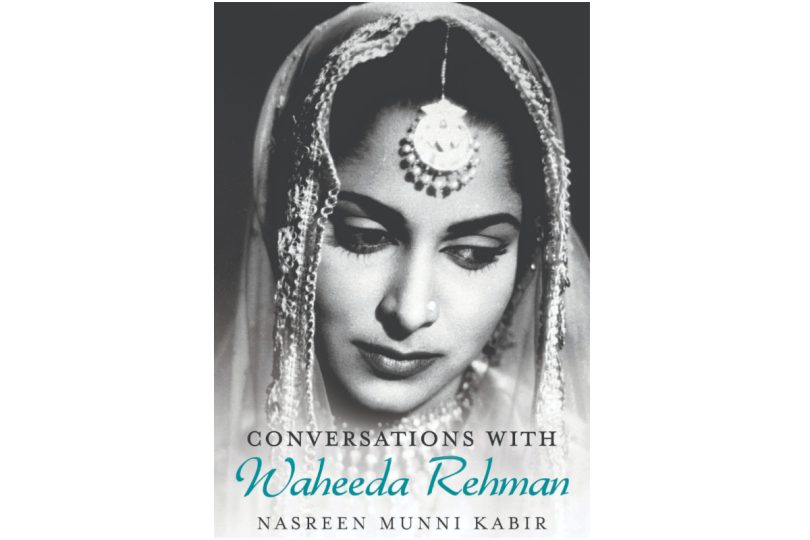Yesteryear Bollywood Superstar Waheeda Rehman turned 85 this February; know about her through this book!
If you think that the madness that makes fans follow Bollywood stars is new, then think again, because whenever Waheeda Rehman used to be near a crowd, it would go berserk, wanting to catch a glimpse of her, even if it meant fighting with her leading man. In Conversations with Waheeda Rehman, veteran writer Nasreen Munni Kabir chronicles the actress’s career from a dancer to a Bollywood legend, that too in the actor’s own words.
No, this book is neither an autobiography nor a biography. Still, it would fall under the category of Conversations, where the author’s main job is to bring on paper the words that flow out of the subject’s mouth on different occasions. Fans of autobiographies and biographies might call it lazy writing but when Waheeda Rehman speaks, others can only listen.
If you still don’t believe how popular Waheeda Rehman was during the prime of her career, just go through this book and you will know it straight from her heart. In this book, she tells NMK about her entry in films, her refusal to change her name and to wear clothes without a dupatta, and how she managed to get her way while being a newbie in the industry. She also gets to talk about her leading men like Raj Kapoor, Dilip Kumar, Sunil Dutt, and others, including the one we all want to know about.
The name’s Dutt, Guru Dutt who introduced Waheeda Rehman to the film world, and fell in love with her which ended in suicide after she refused to reconcile with him in one of their last meetings. She explains in a few words her relationship with her mentor and speaks about their earlier films, such as Pyaasa, Kaagaz Ke Phool, Chaudvin Ka Chand, and Sahib Biwi aur Ghulam but doesn’t talk about the affair much. However, bulks of the pages are dedicated to Guru Dutt which sort of bores the readers who want to know about Waheeda Rehman, not an affair she never acknowledged.
After all, for an actress who has been around since the 1950s, she has seen it all. She was there when the three giants – Dilip Kumar, Dev Anand, and Raj Kapoor – ruled the cinema; she was part of both the Rajesh Khanna wave as well as the Angry Young Man era which succeeded it. She gives her insights into all these eras but they are dwarfed when compared with Guru Dutt and the mention of his sad domestic life. Thankfully, her transition from being a beautiful face to a talented actress gets mentioned in these pages, as does her experience of doing character roles to keep herself going.
If you didn’t know that Waheeda Rehman played a vamp in her debut film, that Guide was made both in English and Hindi, that she had to give 104 takes for a scene in Pyaasa, and that she doesn’t feel great about modern-day songs, all you have to do is go through these pages and know all there is to know about the journey of Waheeda Rehman. She explains why change is always needed and describes the many changes that occurred around her since her debut in the mid-50s.
The worst thing about this book is the author’s way of getting the job done. She might know a lot about Waheeda Rehman but the book is for the readers, not for the writer and there are many instances that require an explanation from the author, which doesn’t happen here. The writer pens the conversations as it is, and in the end, makes the readers wonder whether their money was well spent went down the drain.
Yes, the anecdotes mentioned in these pages make things interesting like her decision not to change her name didn’t make her first director Raj Khosla happy; Raj Kapoor got into a fight with her fans during the shoot of Teesri Kasam who wanted to catch a glimpse of hers; she looked so sensual in the title song of Chaudhvin Ka Chand that the Censor people were alarmed and wanted to dim down the ‘effect’; and she was the original choice to play Amitabh Bachchan’s mother in Kabhie Khushi Kabhi Gham but dropped out due to her husband’s illness.
Waheeda Rehman talks about it at length as does her transition to an actress who does selective films, and how she has managed to stay relevant in an industry that forgets actors once they are out of sight The readers also find out that before Vijay Anand finally cast Waheeda Rehman as Rosie in Guide, Satyajit Ray had suggested her to read the book on which it was based because at that time he was interested in making the movie. Now that Guide would have been great, but the one that was finally made wasn’t far behind.







